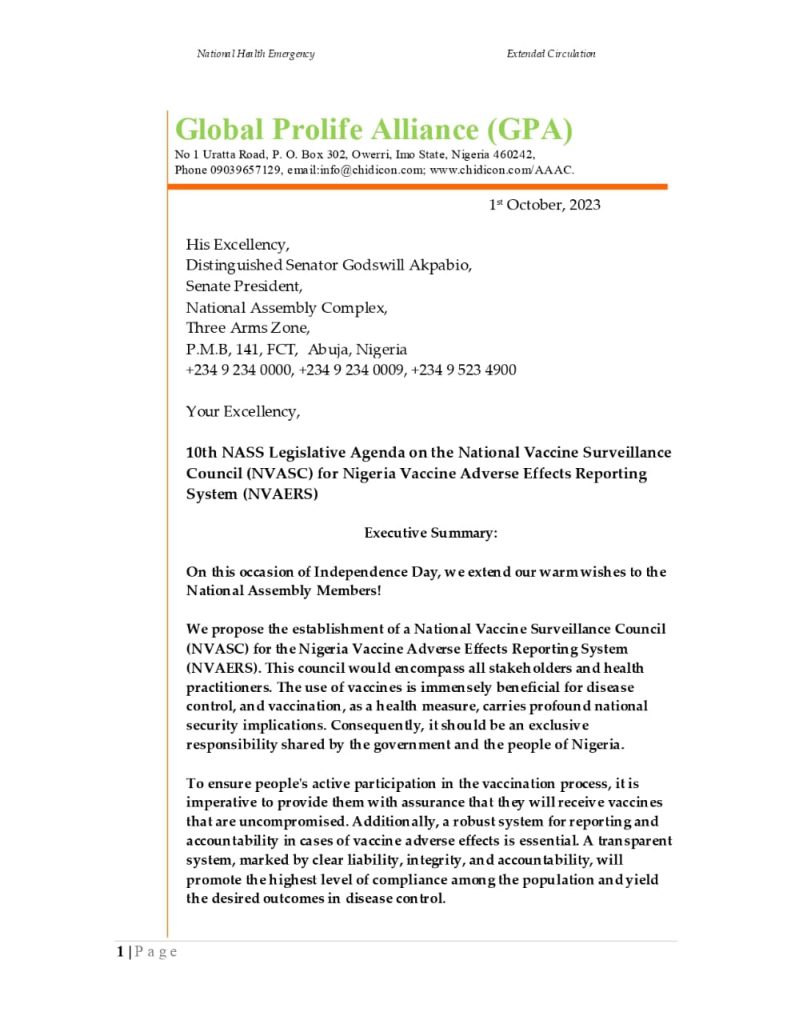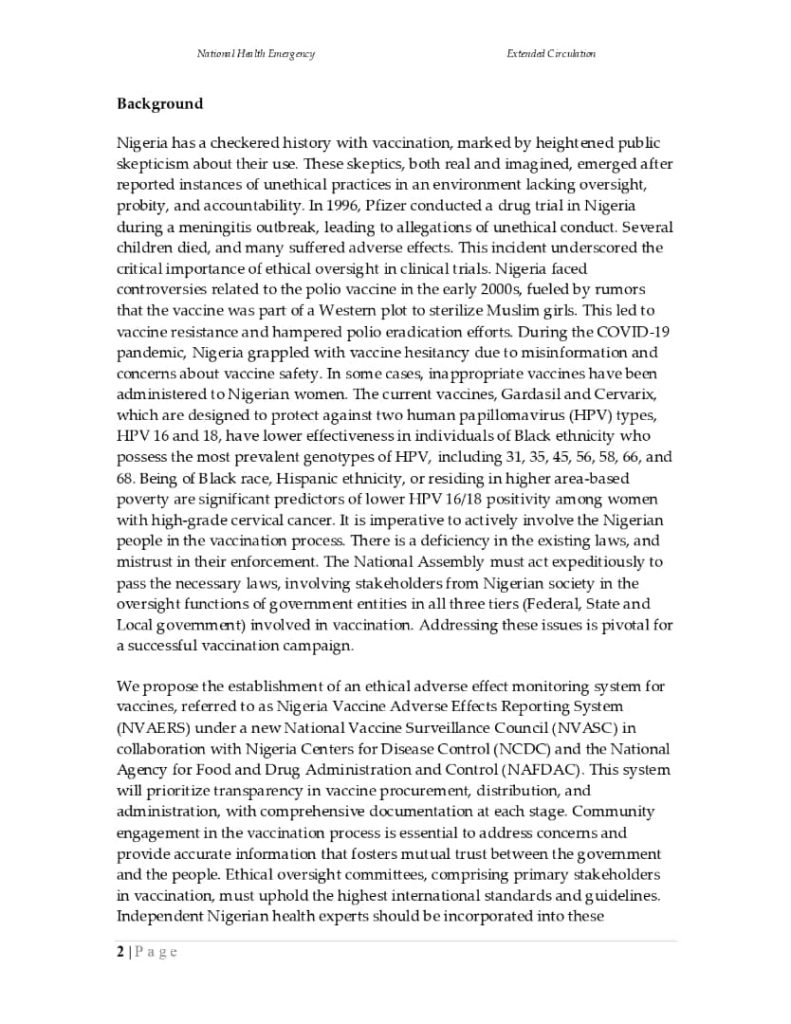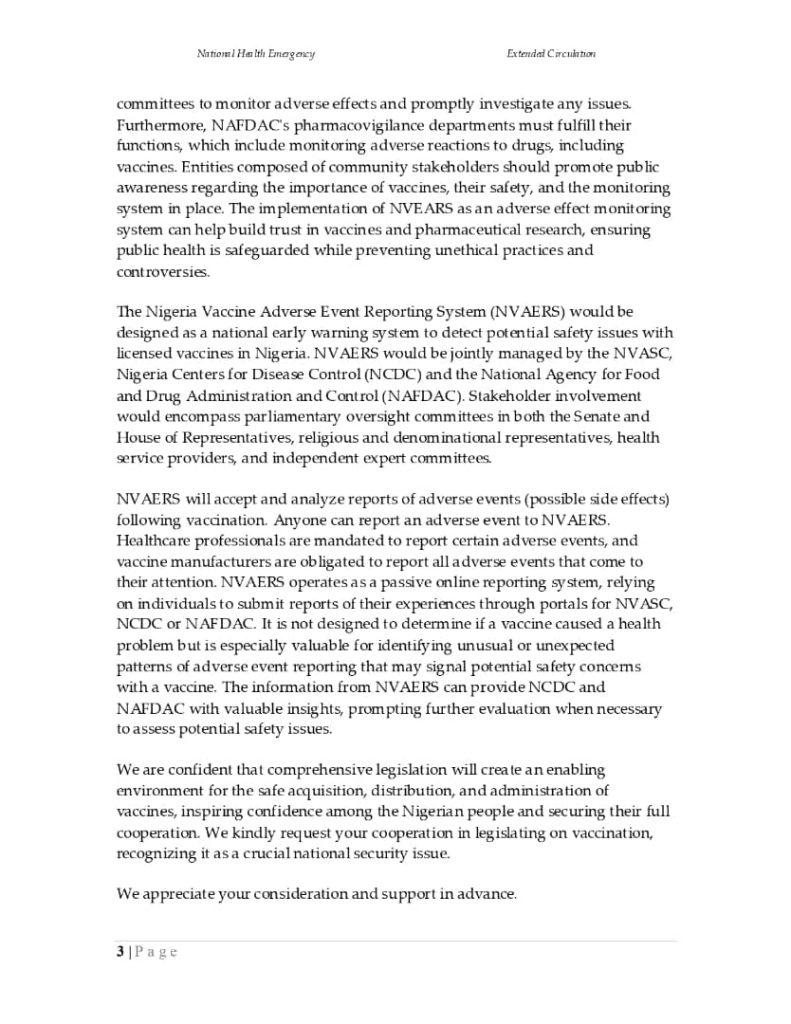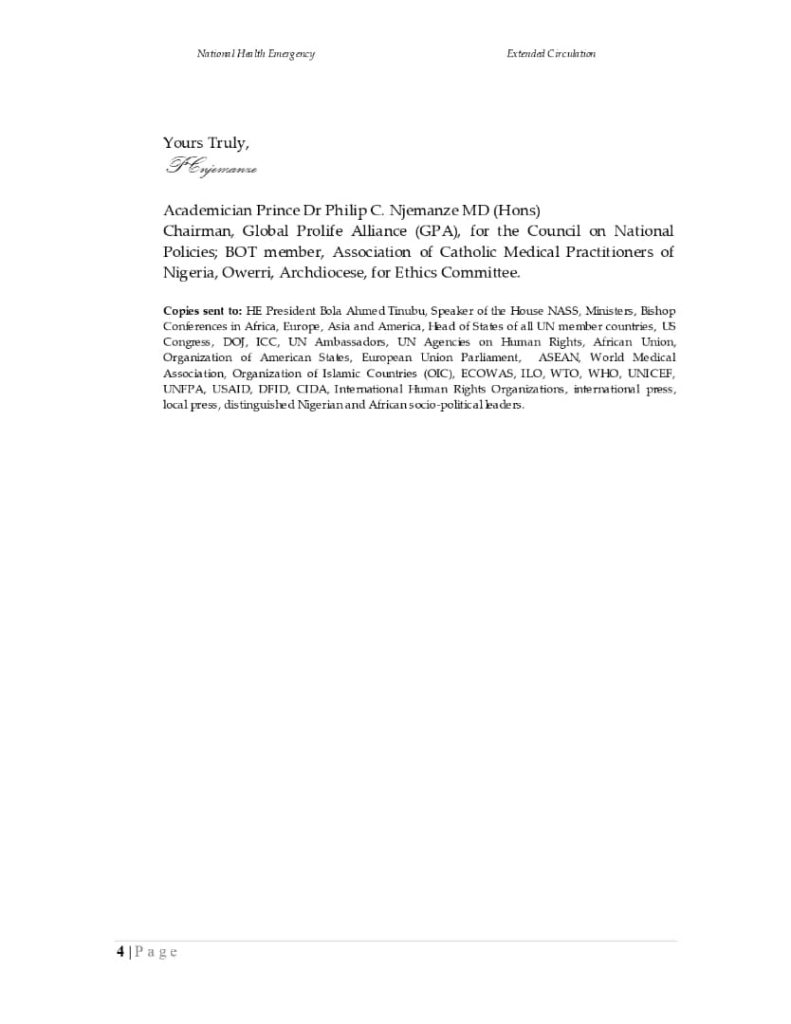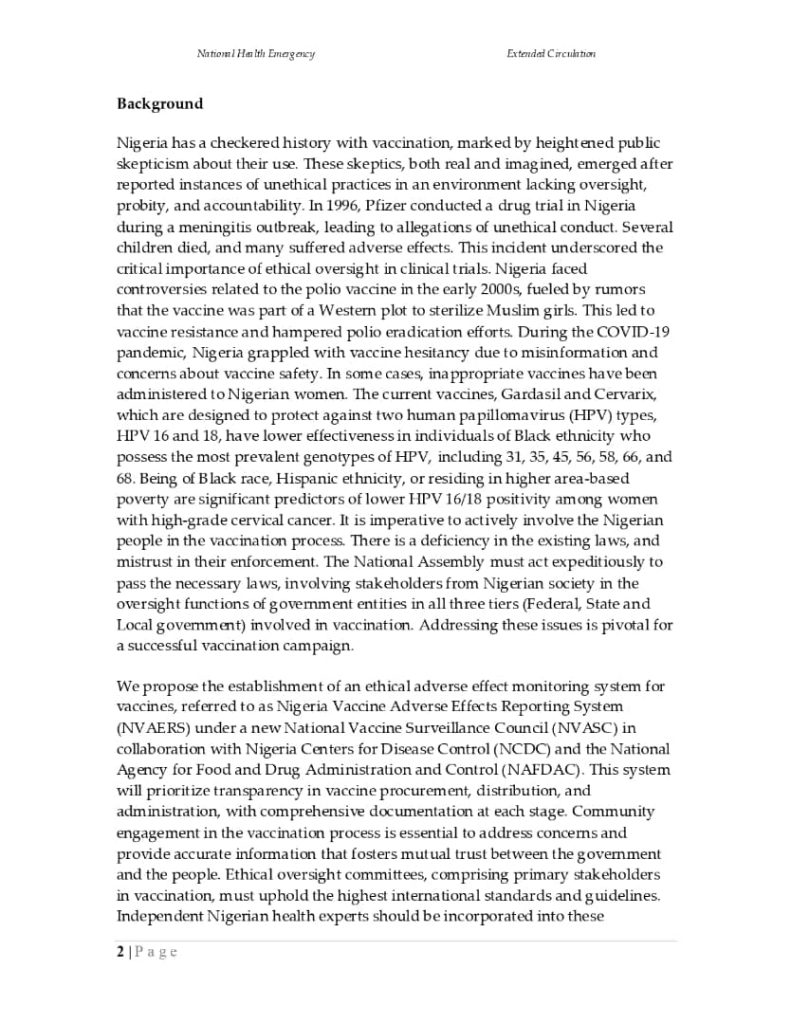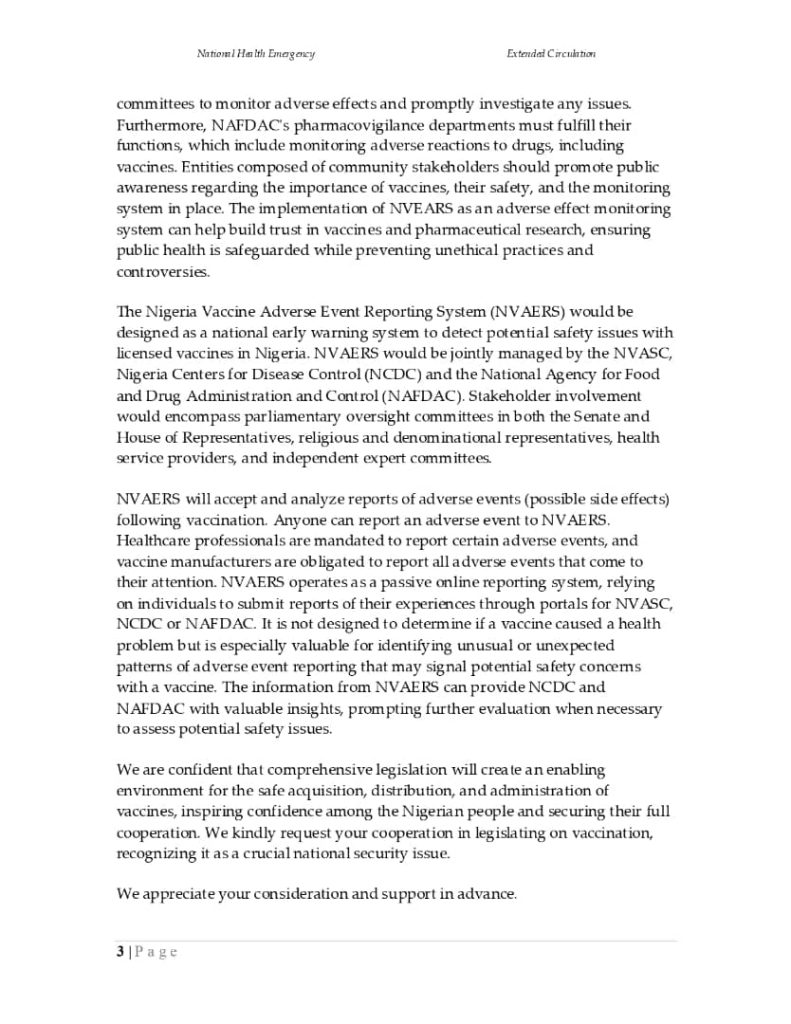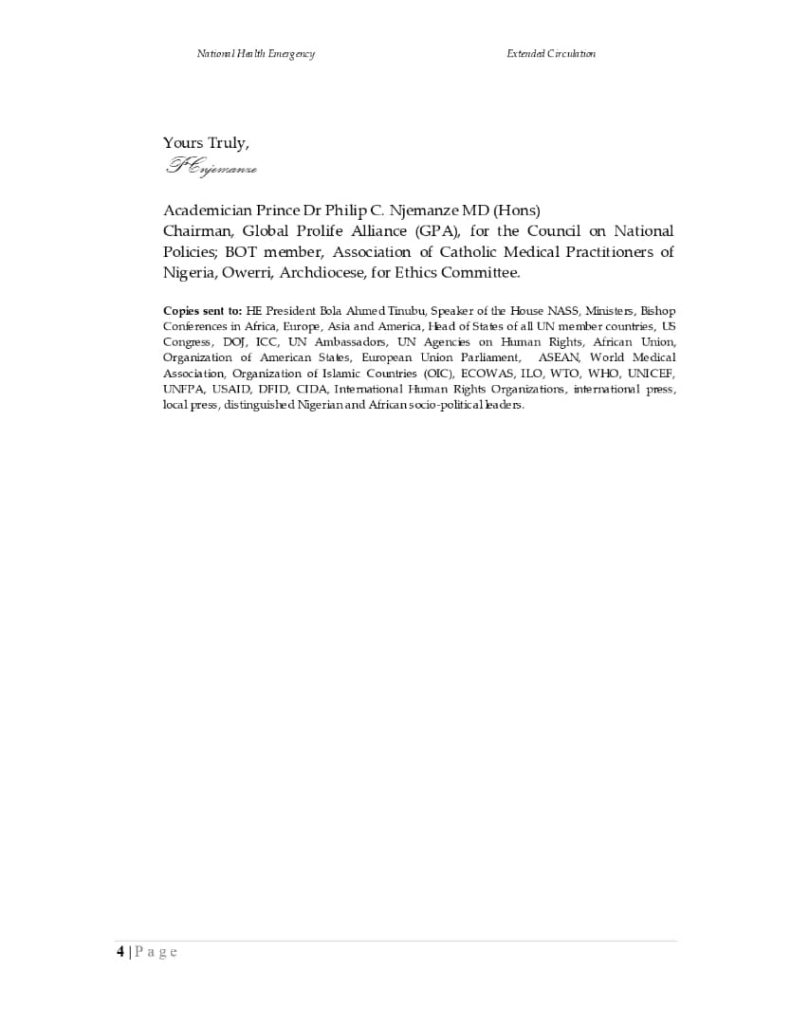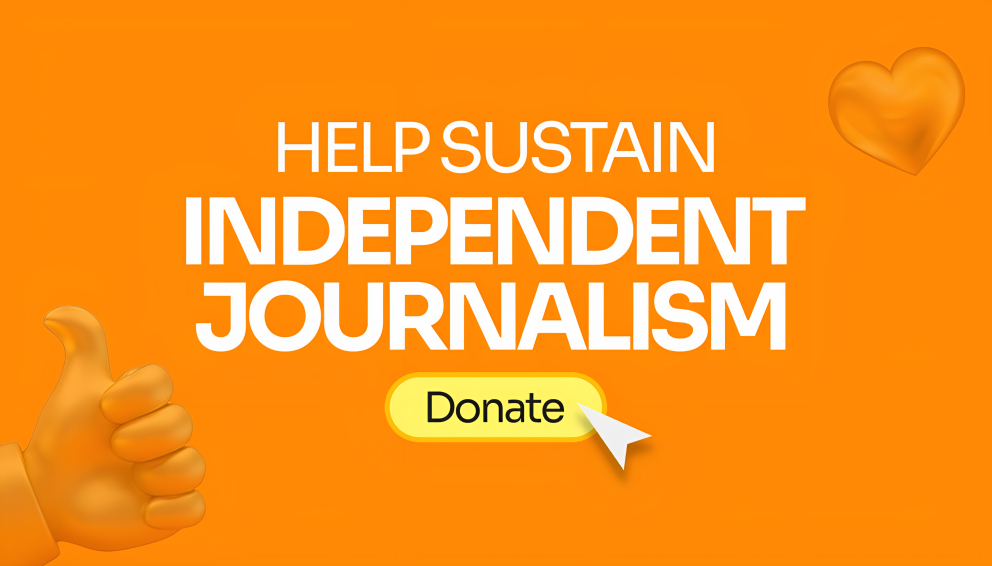The Global Pro-life Alliance, GPA, led by Imo State born medical doctor and academician, Philip Njemanze, has proposed to the Nigerian Senate, the establishment of a National Vaccine Surveillance Council (NVASC), for Nigeria Vaccine Adverse Effects Reporting System (NVAERS).
In a letter dated October 1, 2023, to the Senate President, Senator Godswill Akpabio and Speaker, House Of Representatives, Tajudeen Abbas, Njemanze noted that “this council would encompass all stakeholders and health practitioners”
The full letter reads:
Global Prolife Alliance (GPA) 1st October, 2023
His Excellency,
Distinguished Senator Godswill Akpabio,
Senate President,
National Assembly Complex,
Three Arms Zone,
P.M.B, 141, FCT, Abuja, Nigeria
+234 9 234 0000, +234 9 234 0009, +234 9 523 4900
Your Excellency,
10th NASS Legislative Agenda on the National Vaccine Surveillance Council (NVASC) for Nigeria Vaccine Adverse Effects Reporting System (NVAERS)
Executive Summary:
On this occasion of Independence Day, we extend our warm wishes to the National Assembly Members!
We propose the establishment of a National Vaccine Surveillance Council (NVASC) for the Nigeria Vaccine Adverse Effects Reporting System (NVAERS). This council would encompass all stakeholders and health practitioners. The use of vaccines is immensely beneficial for disease control, and vaccination, as a health measure, carries profound national security implications. Consequently, it should be an exclusive responsibility shared by the government and the people of Nigeria.
To ensure people’s active participation in the vaccination process, it is imperative to provide them with assurance that they will receive vaccines that are uncompromised. Additionally, a robust system for reporting and accountability in cases of vaccine adverse effects is essential. A transparent system, marked by clear liability, integrity, and accountability, will promote the highest level of compliance among the population and yield the desired outcomes in disease control.
Background
Nigeria has a checkered history with vaccination, marked by heightened public skepticism about their use. These skeptics, both real and imagined, emerged after reported instances of unethical practices in an environment lacking oversight, probity, and accountability. In 1996, Pfizer conducted a drug trial in Nigeria during a meningitis outbreak, leading to allegations of unethical conduct. Several children died, and many suffered adverse effects. This incident underscored the critical importance of ethical oversight in clinical trials. Nigeria faced controversies related to the polio vaccine in the early 2000s, fueled by rumors that the vaccine was part of a Western plot to sterilize Muslim girls. This led to vaccine resistance and hampered polio eradication efforts. During the COVID-19 pandemic, Nigeria grappled with vaccine hesitancy due to misinformation and concerns about vaccine safety. In some cases, inappropriate vaccines have been administered to Nigerian women. The current vaccines, Gardasil and Cervarix, which are designed to protect against two human papillomavirus (HPV) types, HPV 16 and 18, have lower effectiveness in individuals of Black ethnicity who possess the most prevalent genotypes of HPV, including 31, 35, 45, 56, 58, 66, and 68. Being of Black race, Hispanic ethnicity, or residing in higher area-based poverty are significant predictors of lower HPV 16/18 positivity among women with high-grade cervical cancer. It is imperative to actively involve the Nigerian people in the vaccination process. There is a deficiency in the existing laws, and mistrust in their enforcement. The National Assembly must act expeditiously to pass the necessary laws, involving stakeholders from Nigerian society in the oversight functions of government entities in all three tiers (Federal, State and Local government) involved in vaccination. Addressing these issues is pivotal for a successful vaccination campaign.
We propose the establishment of an ethical adverse effect monitoring system for vaccines, referred to as Nigeria Vaccine Adverse Effects Reporting System (NVAERS) under a new National Vaccine Surveillance Council (NVASC) in collaboration with Nigeria Centers for Disease Control (NCDC) and the National Agency for Food and Drug Administration and Control (NAFDAC). This system will prioritize transparency in vaccine procurement, distribution, and administration, with comprehensive documentation at each stage. Community engagement in the vaccination process is essential to address concerns and provide accurate information that fosters mutual trust between the government and the people. Ethical oversight committees, comprising primary stakeholders in vaccination, must uphold the highest international standards and guidelines. Independent Nigerian health experts should be incorporated into these committees to monitor adverse effects and promptly investigate any issues. Furthermore, NAFDAC’s pharmacovigilance departments must fulfill their functions, which include monitoring adverse reactions to drugs, including vaccines. Entities composed of community stakeholders should promote public awareness regarding the importance of vaccines, their safety, and the monitoring system in place. The implementation of NVEARS as an adverse effect monitoring system can help build trust in vaccines and pharmaceutical research, ensuring public health is safeguarded while preventing unethical practices and controversies.
The Nigeria Vaccine Adverse Event Reporting System (NVAERS) would be designed as a national early warning system to detect potential safety issues with licensed vaccines in Nigeria. NVAERS would be jointly managed by the NVASC, Nigeria Centers for Disease Control (NCDC) and the National Agency for Food and Drug Administration and Control (NAFDAC). Stakeholder involvement would encompass parliamentary oversight committees in both the Senate and House of Representatives, religious and denominational representatives, health service providers, and independent expert committees.
NVAERS will accept and analyze reports of adverse events (possible side effects) following vaccination. Anyone can report an adverse event to NVAERS. Healthcare professionals are mandated to report certain adverse events, and vaccine manufacturers are obligated to report all adverse events that come to their attention. NVAERS operates as a passive online reporting system, relying on individuals to submit reports of their experiences through portals for NVASC, NCDC or NAFDAC. It is not designed to determine if a vaccine caused a health problem but is especially valuable for identifying unusual or unexpected patterns of adverse event reporting that may signal potential safety concerns with a vaccine. The information from NVAERS can provide NCDC and NAFDAC with valuable insights, prompting further evaluation when necessary to assess potential safety issues.
We are confident that comprehensive legislation will create an enabling environment for the safe acquisition, distribution, and administration of vaccines, inspiring confidence among the Nigerian people and securing their full cooperation. We kindly request your cooperation in legislating on vaccination, recognizing it as a crucial national security issue.
We appreciate your consideration and support in advance.
Yours Truly,
PCnjemanze
Academician Prince Dr Philip C. Njemanze MD (Hons)
Chairman, Global Prolife Alliance (GPA), for the Council on National Policies; BOT member, Association of Catholic Medical Practitioners of Nigeria, Owerri, Archdiocese, for Ethics Committee.
Copies sent to: HE President Bola Ahmed Tinubu, Speaker of the House NASS, Ministers, Bishop Conferences in Africa, Europe, Asia and America, Head of States of all UN member countries, US Congress, DOJ, ICC, UN Ambassadors, UN Agencies on Human Rights, African Union, Organization of American States, European Union Parliament, ASEAN, World Medical Association, Organization of Islamic Countries (OIC), ECOWAS, ILO, WTO, WHO, UNICEF, UNFPA, USAID, DFID, CIDA, International Human Rights Organizations, international press, local press, distinguished Nigerian and African socio-political leaders.
